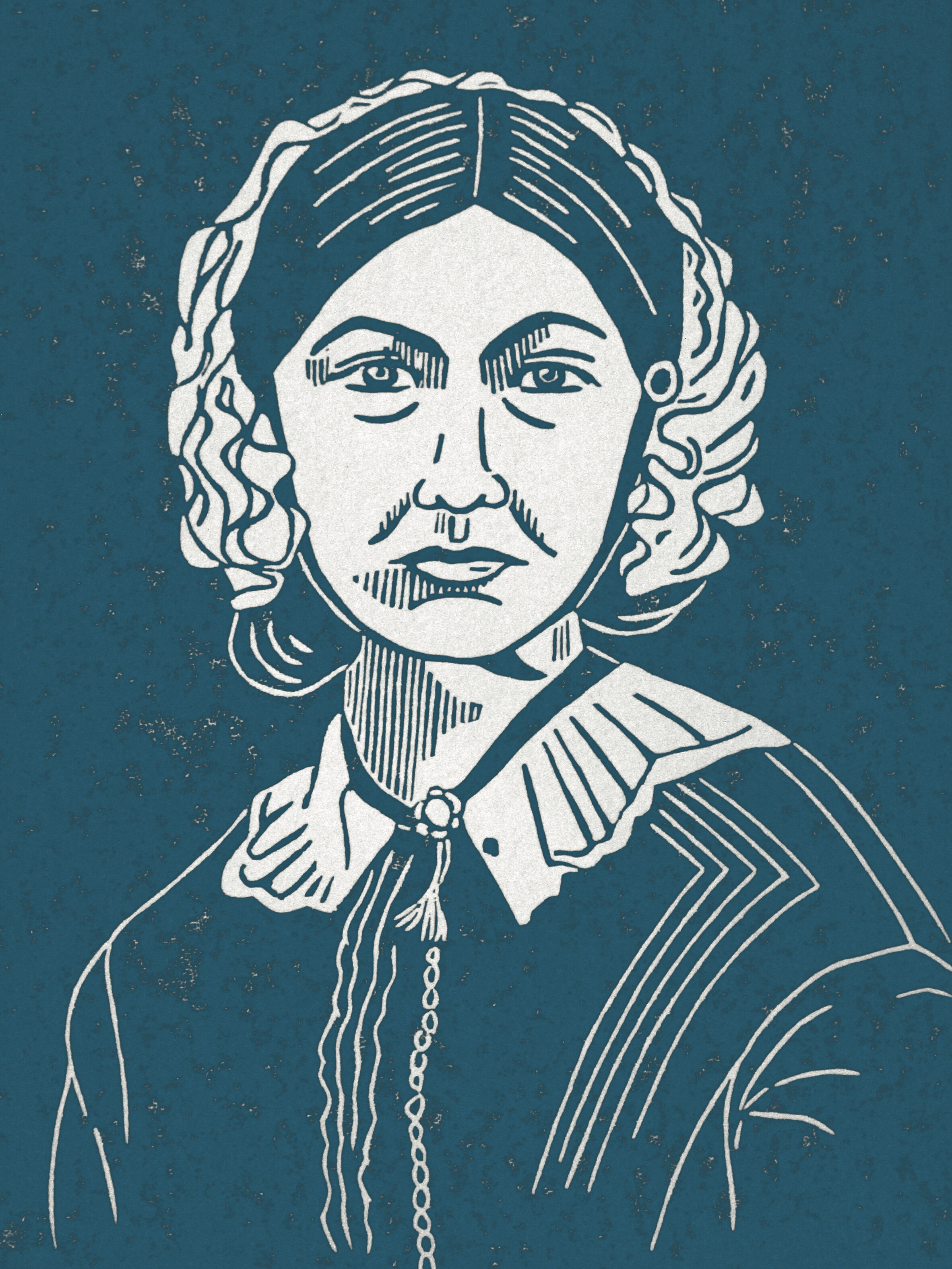The following is a sample profile from the book Holy Troublemakers & Unconventional Saints by Daneen Akers.
Florence Nightingale
A small lamp casts light at the end of a long hospital hallway, late at night. A woman in a long dress with an apron makes her way carefully down the hall, peeking her head into rooms full of injured soldiers. She checks to make sure each patient is as comfortable as possible.
“Thank you, Nurse,” one man says as she helps him reach a glass of water.
“You’re welcome,” she says quietly. “Now, get some rest. Your body needs sleep as much as any medicine.”
It’s 1854, and this is a field hospital in what is now Istanbul, Turkey during the Crimean War. And the woman doing late-night rounds is Florence Nightingale, known now the world over as the “Lady with the Lamp” and the founder of modern nursing.
Florence’s pioneering work improving sanitary conditions in hospitals and implementing basic guidelines like frequent hand washing and daily laundering of linens and bandages saved the lives of thousands of British soldiers during the Crimean War, but many people don’t know that in addition to being a nursing pioneer, Florence was also a scientist, statistician, and a woman of deep faith.
Illustration by Ondine Crispin
Florence was born in 1820 in Florence, Italy to a wealthy British family. Her parents returned to England when she was young, and Florence grew up on large estates. Her parents expected that when she was grown up, Florence would marry a man from a similar social class, keep a fancy house, and have children. But Florence had different ideas. From a young age, she found social gatherings awkward and preferred being away from the center of attention. She found ways to help sick people in the community, especially those from poor families.
Luckily, Florence’s father believed in educating his daughters beyond the rules of social etiquette and running a household. He taught her Italian, Latin, Greek, philosophy, history, mathematics, and writing. Florence loved learning, and she especially loved mathematics.
When she was 17, Florence felt a direct call from God to serve people through nursing. She had to muster every ounce of determination she could to convince her parents of this. At that time, women from wealthy families were expected not to have a profession or be employed. Additionally, nursing wasn’t seen as a respectable profession for women.
After she turned down a marriage proposal from a young man her parents approved of, Florence finally convinced them that marriage and family life were not for her. She knew God wanted something else from her. She wrote in her diary: “God called me in the morning and asked me would I do good for Him.”
Her parents relented and sent her to a Lutheran nursing school in Germany. When Florence returned to England, she took a job at a London hospital. Within a year, she was promoted to superintendent. In 1853, the Crimean War began. Photographs and reports from the front lines showed the British public that injured soldiers had to endure appalling conditions in the field hospital, and Florence was recruited to lead a new division of nurses to help. Within days, she and several dozen nurses (many of them Catholic nuns) sailed to the British base in Constantinople. She became the first woman in charge of a field hospital.
The conditions at the hospital were even worse than the reports had said. Built over a cesspool, the hospital had dirty water, rats in the hallways, and putrid air. The men had little food, soap, or clean bandages. They were dying of infectious diseases such as cholera and typhoid at much higher rates than they were dying from their battle wounds. The nurses went to work cleaning, organizing, and caring for the injured soldiers. Florence believed that healthy living conditions such as fresh air, good food, clean linens, and access to books and the outdoors would help the men improve as much as anything else. She also implemented frequent hand washing even though germ theory was not yet widely understood. Soon, the death rate at her hospital improved dramatically. When, before, more than 40 percent of the injured men died, the rate after Florence took charge dropped to only 2 percent.
Florence returned home to public praise, an award from Queen Victoria, and a grant for a large sum of money from the British government. She used the money and the good will to start The Nightingale Training School for Nurses, the first secular nursing school in the country.
Florence had many ideas about how to reform hospitals in the military and for civilians based on her experiences. She wrote detailed reports arguing for changes based on the data she had observed first-hand. She was gifted with statistics and graphical presentations of information, which was a new concept at that time. Her use of polar area diagrams (charts and graphs that show complicated information visually) was revolutionary for her time.
Due to her fame, skill as a writer and statistician, family wealth and connections, and the popularity she had in the press because of her impressive reforms at the military hospital, Florence won the respect of military leaders and politicians. Her ideas led to sweeping hospital reforms in both military and civilian hospitals. Modern nursing was born. Florence wrote a textbook on nursing that became the standard all over the world. In addition to modern nursing reforms, Florence also helped the average person live many more years simply through better hygiene and public sanitation. She helped influence England’s Public Health Acts of 1874 and 1875, which required property owners to connect sewage pipes to main drains. These public health and sanitation changes led to the average British citizen living an additional 20 years.
While Florence is remembered for her heroics in the Crimean War, most people don’t know that she also lived with chronic pain and fatigue. Much of her writing was done from bed because she developed an illness during her time at the field hospital that left her with frequent fevers, night sweats, intense muscle and joint pain, and depression. While we can’t know for certain what health condition Florence had, her birthday is now celebrated as the National Fibromyalgia Awareness Day because her pain, fatigue, and subsequent depression symptoms so closely match the symptoms of fibromyalgia patients.
Throughout her life, faith mattered greatly to Florence, but her expression of faith was unconventional for the time, much like her life’s work. She remained a deeply religious person and a member of the Church of England, but she was accused of unconventional beliefs. She kept many private diaries and wrote extensively to friends about her religious questions and convictions. She had little patience for the male-dominated authority of the church, and she never tired of learning about the world and other cultures. She believed strongly that all religions contained truths and deserved respect. Florence questioned the concept of hell. She thought that a truly good and loving God would likely find a way to save all people. She once comforted a dying prostitute who thought she was going to be condemned by God with these words, “My girl, are you not now more merciful than the God you think you are going to? Yet the real God is far more merciful than any human creature ever was or can ever imagine.”
Florence lived her life dedicated to serving other people. She had little patience for religious people who worried endlessly about their own, private salvation. Instead, seeing the suffering of people around her made Florence convinced that our job is to work on behalf of others. She wrote to a friend about this underlying motivation for her life’s work: “There will be no heaven for me, nor for anyone else, unless we make it.”
How might being unconventional in life lead to breakthroughs and new ideas?
Glossary Terms
Called/Calling
The sense that God, or a messenger of God, has specifically assigned a person a certain job; often applied in religious job settings, such as, “I was called to become a minister.”
Catholic
A person who is a member of the oldest and largest Christian church. Until the Protestant Reformation in the 16th century, the Roman Catholic Church was the only Christian church; it formed after the Roman Emperor Constantine declared Christianity the official religion of the empire in 313 AD and demanded conformity of beliefs among the various Christian groups and a highly organized church structure.
Conviction
A strong, unchanging belief.
Crimean War
A military conflict between Britain, France, Turkey, and Sardinia against Russia from 1853-1856; causes of the war included Russian expansion in Europe and the rights of Christian minorities in the Holy Land.
Culture
The customary beliefs, traditions, art, food, dress, and ideas of a particular people and place.
Fibromyalgia
A physical condition that causes extreme tiredness and pain.
Germ Theory
The understanding that disease is caused by bacteria, viruses, and other tiny organisms that we can’t see without a microscope.
Salvation
To be saved from danger; for some Christians, this means being saved from sin; for other Christians, this means working together to save vulnerable people from harmful laws or policies.
Saved
An idea in Christianity, especially Evangelical Christianity, that refers to whether a person has accepted Jesus as their personal savior. Like the idea of Salvation, different types of Christians use this term differently; for many Christians featured in this book, Jesus’s teachings are what saves us.
Secular
Something that isn’t seen as religious or sacred.
Unconventional
Not thinking the same way or behaving like most other people around you; having new, fresh ideas.
Read another sample chapter from the Holy Troublemakers & Unconventional Saints book by Daneen Akers.



